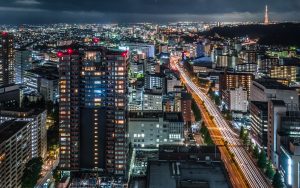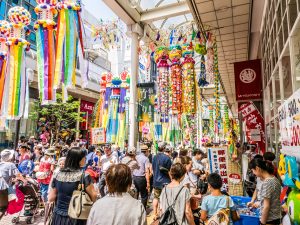 About Sendai
About Sendai
Sendai is an ordinance-designated city located in the centre of Miyagi Prefecture. It has a population of around 1.09 million and is the largest city in the Tohoku region (Northeast Japan).
The city is sandwiched between the abundant nature of the Pacific Ocean lying to its east and Mt. Zao to its west. The heart of Sendai also has the Hirose River and Mt. Aoba, and the city is called the City of Trees due to its green-filled urban and suburban features.
Natural heritage is not the only thing treasured by locals. Many of its traditional celebrations from the time when it was ruled by Sendai’s feudal lord Date Masamune continue to this day. The combination of scale, culture and scenery makes the city worthy of being called the heart of Tohoku.
State of the Local Economy
The economy in Sendai faces significant issues. Large companies with their headquarters in the city are almost non-existent. As a result, the local economy is reliant on branches and regional subsidiaries from firms with a greater national presence elsewhere. These company branches account for 40% of all businesses in Sendai. Although Sendai is able to attract many of the students from the Tohoku Region thanks to its high number of universities, the city is unable to fulfil its function as the hub of the northeast as it fails to provide work placements for graduates, thus resulting in mass outflow of the young to Tokyo.

Tanabata festival
Sendai’s Economic Policy
The city has drawn up various economic policies to tackle the situation. One of these is the Sendai Future Business Creation Programme
Sendai Future Business Creation Programme
The goal of this programme is to create businesses that can boost the local economy. A partnership was formed between The 77 Bank (Sendai’s largest local bank), Tohoku University and Tokyo Stock Exchange, and with the cooperation of other firms and organisations will provide support to local SMEs with a view to having them qualify for listing on the stock market within five years under approval as a Sendai Future Business.
The programme includes:
- Listing advice and progress management from a consultant.
- Private consultation from lawyers, certified tax accountants and other specialists related to listing.
- PR support.
- Additional benefits related to the city’s economic policies (additional points for grant screening).
Out of the 2019 new companies that applied, eight companies who set up their headquarters around the Sendai area were given accreditation by the Sendai Future Business Creation Programme. These include businesses related to disability welfare services, IT services, Tohoku University venture businesses and disaster prevention services.
With many cities facing similar problems, this radical initiative which has yet to be seen in Japan will be gaining a lot of attention to see what kind of outcomes it produces.
Assista – Sendai Business Support Centre
In addition to providing support to local SMEs, support is also provided for start-ups with the aim of having the most number of new business launches in Japan. Assista is a facility that provides business ideas, business plan consultations and post-launch follow-up consultations for free to anyone who wants to set up a company in Sendai. Around 100 events are held a year including seminars given by entrepreneurs and conferences on business models for creators. SME consultants are also on-site and are able to provide consultation on issues related to launching a company as an entity.
Thanks to Assista’s support, 400 new businesses were successfully launched over the last four years and continues to work on driving Sendai’s economy.
These economic support initiatives are funded by taxes from the city government and affiliated government bodies. For FY 2019, the budget for local SME support and business support came to 190 million yen and 130 million yen respectively. As Sendai is the heart of the Tohoku region, not only does the city consider the effects on the local economy, but for the region as a whole.

